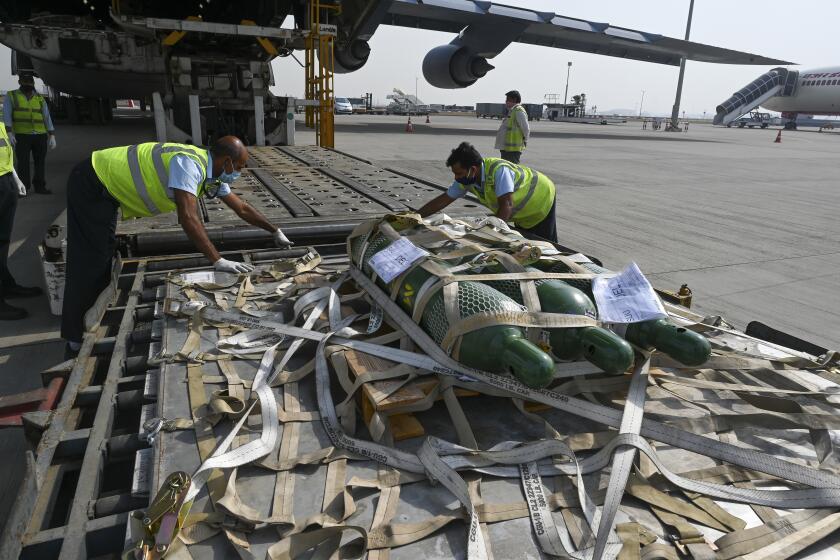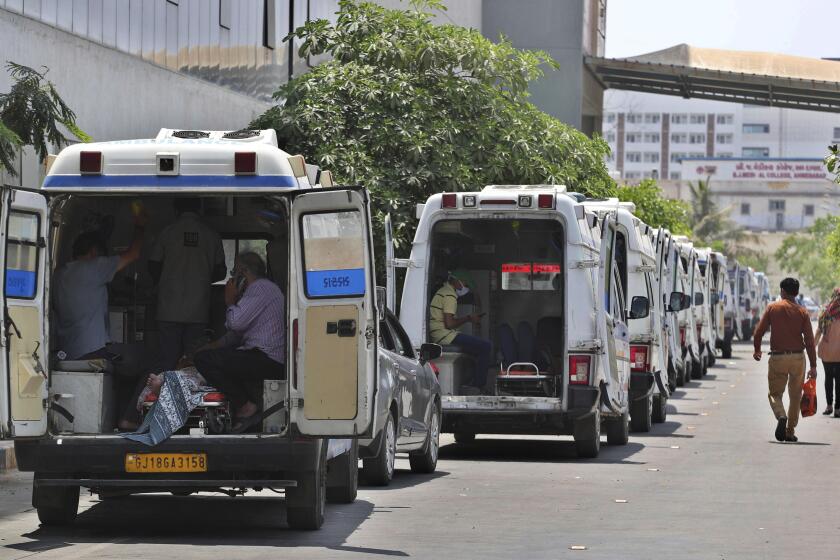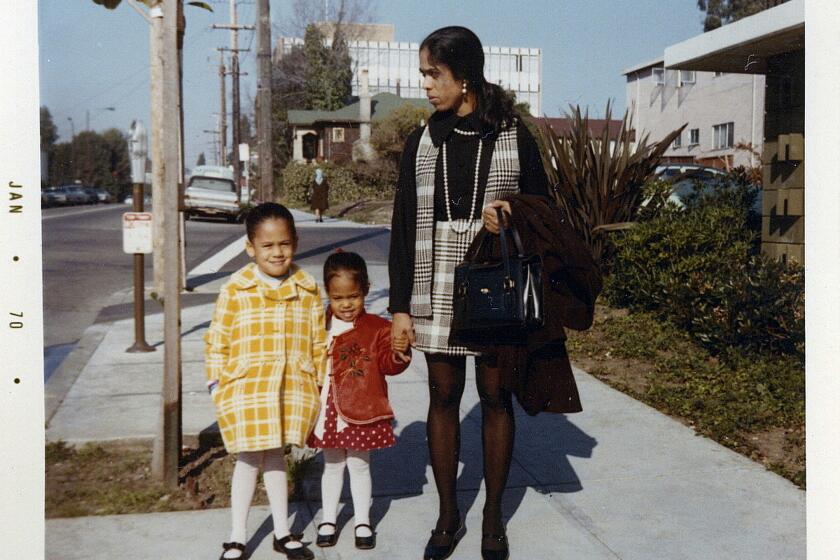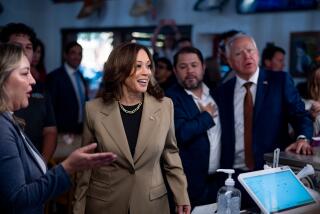Massive COVID-19 crisis is affecting many in India, including Kamala Harris’ family
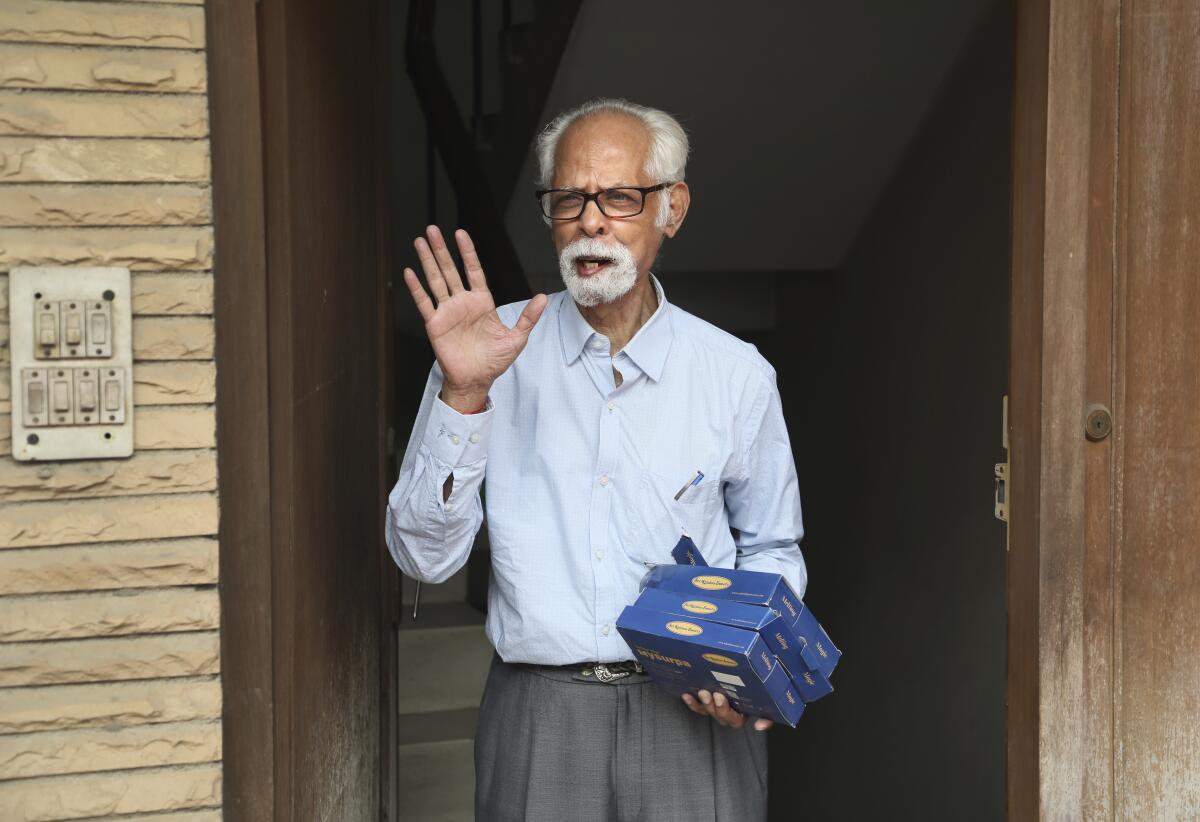
- Share via
WASHINGTON — G. Balachandran turned 80 this spring — a milestone of a birthday in India, where he lives. If not for the COVID-19 pandemic, he would have been surrounded by family members who gathered to celebrate with him.
But with the coronavirus ravaging his homeland, Balachandran had to settle for congratulatory phone calls, including one from his rather famous niece: Vice President Kamala Harris.
The retired academic said he spoke with Harris and her husband, Doug Emhoff, for quite a while. To close out the conversation, Harris assured him she’d take care of his daughter — her cousin — who lives in Washington.
“Don’t worry, uncle. I’ll take care of your daughter. I talk to her quite a lot,” Balachandran recalled Harris telling him in their March conversation.
It was the last time they had a chance to speak. Since then, the coronavirus has raged out of control in India, overwhelming the nation’s healthcare system and killing hundreds of thousands of people.
While the crisis in India has created diplomatic and humanitarian challenges for the Biden administration, for Harris it is also personal: Her mother was born there, and she’s spoken emotionally throughout her political career about the influence of her many visits to India as a child.
India’s large diaspora is tapping its wealth, growing political clout and expertise to help India combat a catastrophic coronavirus surge.
On Friday, she’s set to deliver remarks at a State Department event focused on the effort to combat COVID-19 in India, and she’s expected to express U.S. solidarity with the nation.
Speaking in 2018 at a fundraiser for the Indian non-governmental organization Pratham, Harris talked about walking hand in hand with her grandfather, P.V. Gopalan, and listening to him speak with friends about the importance of a free and equal democracy.
“It was those walks on the beach with my grandfather on Besant Nagar that have had a profound impact on who I am today,” she said.
She spoke often on the campaign trail about her late mother, Shyamala Gopalan, a headstrong and resilient woman who bucked tradition and decided to leave India to pursue a career as a scientist at UC Berkeley.
With P.V. Gopalan, an upright civil servant and doting patriarch, Kamala Harris forged one of the defining relationships of her life.
And during her acceptance speech at the 2020 Democratic National Convention, Harris opened her speech with a shout-out to her “chithis” — a Tamil word for aunt. One of those chithis, Sarala Gopalan, is a retired obstetrician who lives in Chennai (formerly Madras).
As a child, Harris used to visit India every other year. Now all that remains of her extended family there are her aunt and uncle. Another Indian-born aunt lives in Canada.
Balachandran said that while he used to hear about friends of friends getting COVID-19, now it’s hitting close to home. Those he knows personally or worked with are getting infected, and some are dying.
“The conditions are pretty bad in India,” he said from his home in New Delhi on Thursday.
It was just the Tamil word for auntie, two syllables in a speech by Kamala Harris last Thursday that covered her childhood, heritage and political awakening and culminated in her acceptance of the Democratic Party nomination for vice president.
Balachandran considers himself one of the lucky ones, as he’s retired and largely stays home alone, going out only occasionally for groceries so that “nobody can infect me other than myself.”
His sister Sarala is the same, he said, and has largely isolated herself in her apartment in Chennai to avoid exposure. Both are fully vaccinated, something he knows is a luxury in India, which has suffered from a severe vaccine shortage.
That shortage is part of what prompted criticism in India of what many saw as an initially lackluster U.S. response to a humanitarian crisis unfolding in their nation over the past month. The U.S. initially refused to lift a ban on exports of vaccine-manufacturing supplies, drawing sharp criticism from some Indian leaders.
When COVID-19 cases in India started to spin out of control in April, there were calls for other countries — particularly the U.S. — to get involved. While a number of countries, including Germany, Saudi Arabia and even India’s traditional foe, Pakistan, offered support and supplies, U.S. leaders were seen as dragging their feet on the issue.
Start your day right
Sign up for Essential California for the L.A. Times biggest news, features and recommendations in your inbox six days a week.
You may occasionally receive promotional content from the Los Angeles Times.
The White House had previously emphasized the $1.4 billion in health assistance provided to India to help with pandemic preparedness and said that it was in discussions about offering aid.
The delay in offering further aid was seen as putting a strain on long-standing close diplomatic relations between the two nations. On April 25, a number of top U.S. officials publicly offered further support and supplies to India — including President Biden, who called Indian Prime Minister Narendra Modi.
Harris’ niece in California, Meena Harris, has retweeted a half-dozen accounts calling for more aid to India, including one from climate activist Greta Thunberg admonishing the global community to “step up and immediately offer assistance.”
Harris’ office declined to comment for this article.
With the death toll soaring, India is reeling from the mistakes made by the Modi government in the new wave of coronavirus infections.
The U.S. announced that it would lift the export ban on vaccine-manufacturing supplies and said it would send personal protective equipment, oxygen supplies, antivirals and other aid to India.
The administration gets no criticism from S.V. Ramanan, a temple administrator of the Shri Dharma Sastha Temple in Harris’ Indian grandfather’s hometown, Thulasendrapuram, in southern Tamil Nadu state, 215 miles from coastal Chennai.
“Everyone has their priorities. America also passed through something similar, and we helped then. Now they are helping us,” he said.
Ramanan said he didn’t expect that Harris’ presence as vice president had fast-tracked aid to India or that it somehow meant help should have come earlier, adding: “I think in general all other countries should help, and I’m glad the U.S. has stepped up.”
Ethnic solidarity with Kamala Harris, the daughter of an Indian immigrant, could draw votes and donations for the Democratic ticket.
He hopes Harris can make a visit to her ancestral village when things are better.
While Harris has embraced her Indian heritage as part of her political profile, in responding to the crisis there she’s been careful to speak from the perspective of a vice president rather than an Indian American worried about her family’s safety.
“We are all part of a world community. And to the extent that any of us, as human beings who have any level of compassion, see suffering anywhere around the world, it impacts all of us,” she told reporters last week in Ohio.
A ban on travel to and from India was announced that day. Harris said only that she hadn’t spoken to her family since the ban was announced.
From her birth in Oakland to the Senate in Washington, D.C., these locations have helped form the new candidate for vice president.
Balachandran, her uncle, doesn’t fault his niece for how the U.S. response has played out.
He said that, knowing Kamala, “she would have done all that she can in order to expedite the matter.”
For now, he’s content with the occasional phone call from her. When the two talk, it’s mostly about family; he doesn’t share much about current affairs in India because, he joked, “she’s got a whole embassy that’s sending her cables every hour on all of India!”
But he does hope to visit the vice president’s residence in Washington at the Naval Observatory when he can travel again. Balachandran said he’d like to meet Biden again and remind him that the last time they met was when Biden was vice president and swore in Harris as a U.S. senator.
“I wish we could all be together at the same time,” he said of the extended family, “but that’s a big wish to look for at this moment.”
More to Read
Sign up for Essential California
The most important California stories and recommendations in your inbox every morning.
You may occasionally receive promotional content from the Los Angeles Times.
